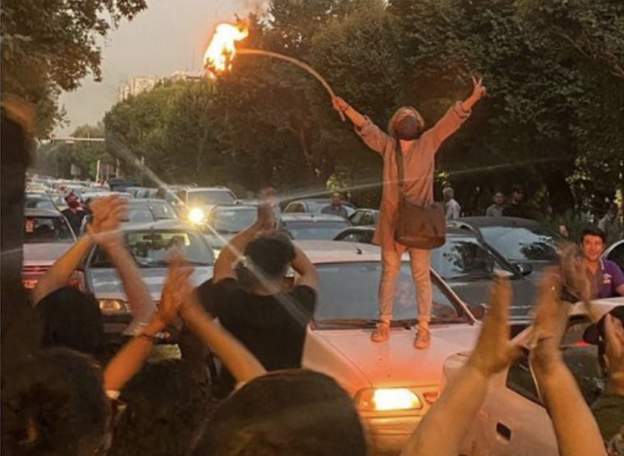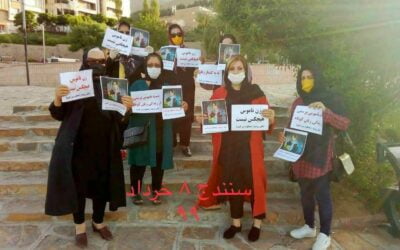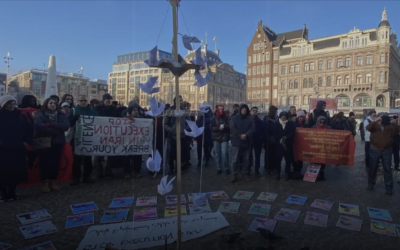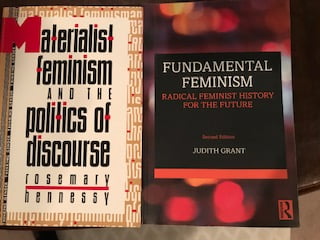At this time, international solidarity with women in Iran is critically important in order to help the continuation of the current courageous wave of protests in defense of women and against state brutality. Iranian feminists have already begun this outreach for dialogue and solidarity.
Frieda Afary
The murder of Mahsa Amini, a young Iranian Kurdish woman, by the Tehran morality police has sparked large protests in various cities inside Iran. The 22 year old Amini was arrested on September 13 because of her “improper” hijab and died shortly thereafter when she went into a coma following violent beatings by the police.

Street protests following her death have taken place in several cities in Kurdistan, as well as in Tehran, Isfahan, Rasht, Mashhad and have involved tens of thousands of women and men, young and old. In Tehran, women protesters courageously took off their headscarves while shouting, “Our Hijab will be the Noose Around Your Neck” and “Neither Monarchy, Nor Clergy”. Mass protests focusing on defending women’s rights have been unprecedented since the March 8, 1979 women’s demonstrations that opposed the Islamic fundamentalist takeover of the 1979 Revolution against monarchy.
Nasrin Sotoudeh, Iranian feminist human rights attorney who has been imprisoned for many years and is currently out on furlough, issued the following statement about the murder of Mahsa Amini:
“All the officials and agents of the Morality Police involved in her arrest should be put on trial. We will not forget the memory of women who have been the target of state violence for defying the compulsory hijab. From Homa Darabi who was expelled from the university due to compulsory hijab and burned herself in the early seventies {1990s} to women of Revolution Street who have been subjected to violent assaults and beatings, to Nastaran Darabi whose beautiful hair was stomped upon under the boots of a hateful and violent man from the Morality Police, to Sepideh Rashnoo who was heading to her job, to thousands of young girls and women who are subjected to insults and attacks and arrest on a daily basis, all weigh heavily on our memory of yesterday and today. Stop obsessing over women’s hair, our hair is not more dangerous than your violence. Our children and yours are witnessing this violence. In the not so distant future, these waves of violence will turn on you. I extend my deep condolences to her esteemed mother, who has lost an angel, and to our collective conscience, which is so deeply wounded. We are in mourning.”
The Context:
The majority of Iran’s population of 84 million are currently facing severe unemployment, poverty, hunger, environmental disasters, COVID and other health problems. The Iranian government has taken advantage of the current crises to crack down further on women by more strictly enforcing the mandatory hijab and by banning access to basic birth control and even vasectomy for men and tubal ligation for women.
While the majority of the Iranian public is hungry and ill-housed, the Iranian government continues to spend billions on its nuclear program, military interventions and militias in Syria, Iraq, Lebanon. It is building drones for Russia to use for its genocidal invasion of Ukraine.
Although most Iranians would welcome the lifting of Western economic sanctions on Iran, they are certain that the bulk of the funds gained as a result will go toward the government’s militaristic aims and in the pocket of the leaders of the Islamic Revolutionary Guard Corps. Ebrahim Raisi, Iran’s illegitimate president, who is currently at the United National General Assembly meeting, was the former head of Iran’s judiciary and has committed crimes against humanity.
What To Do
At this time, international solidarity with women in Iran is critically important in order to help the continuation of the current courageous wave of protests in defense of women and against state brutality. Iranian feminists have already begun this outreach for dialogue and solidarity. A powerful message of international solidarity can be found in Nasrin Sotoudeh’s June 2022 statement in response to the U.S. Supreme Court’s decision to take away U.S. women’s federal constitutional right to abortion. In a letter to Ms. Magazine, Sotoudeh wrote:
“In these difficult times, when the women’s movement in the United States is facing assault and the right to abortion has been radically restricted, I wish to stand by you and declare my support from our corner of the world . . After the 1979 Iranian Revolution, new laws that drastically stripped women and girls of their rights were part of an insidious larger effort to limit civil liberties for everyone. As someone who lived through (and campaigned against) this loss of freedom and democracy, I can offer a warning: It will not end with this Supreme Court decision on abortion. Women in Iran continue to face laws that restrict rights over our bodies, and even over the ability to think for ourselves. We are denied the same opportunities as men in relation to marriage, divorce, child custody, inheritance and travel. This country’s mandatory hijab law forces us to cover our heads whenever we are in public, but it is also a way conservative forces try to exert political control. That control ensnares men, not just women. This may resemble what you experience in the fight for reproductive rights in America.”
This dialogue between women’s struggles around the world needs to continue in order for us to stop the global authoritarian wave and retrogression on gender rights.
Frieda Afary
September 19, 2022
Also listen to an Iranian feminist rapper, Bahar, singing about Mahsa Amini. Bahar is the daughter of one of the political prisoners executed by the Islamic Republic in the 1980s.





